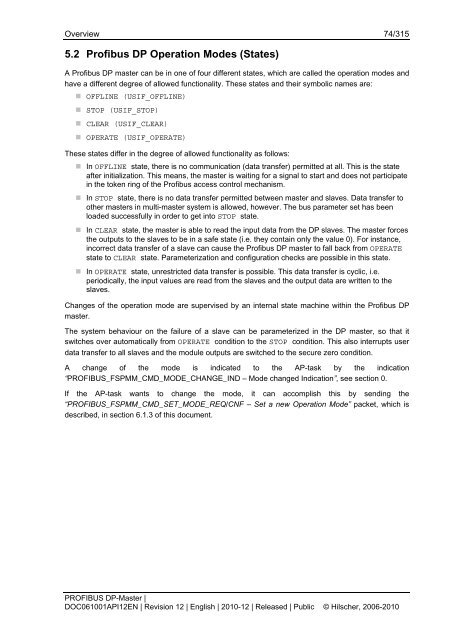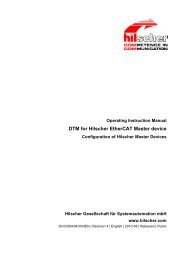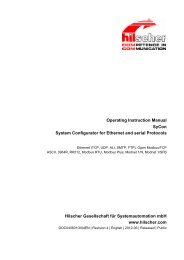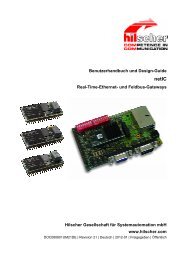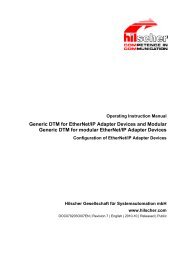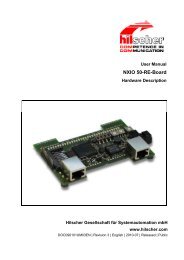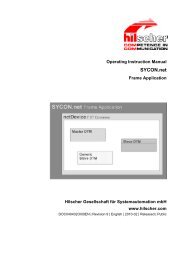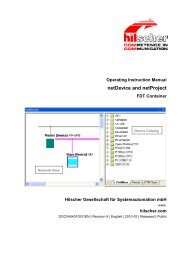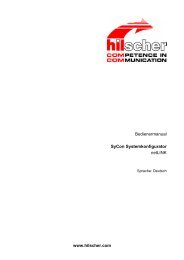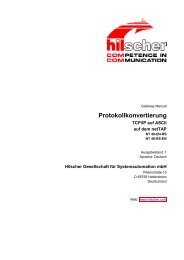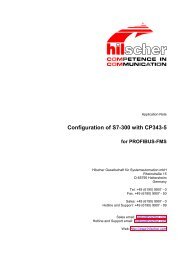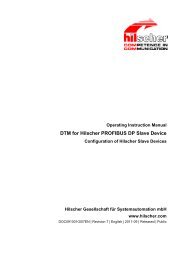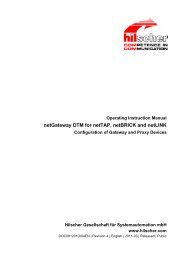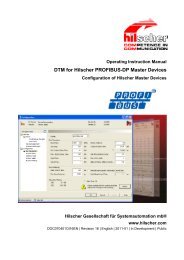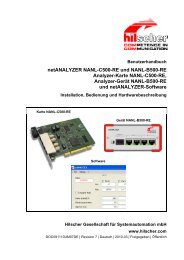- Page 1 and 2:
Protocol API PROFIBUS DP-Master V2.
- Page 3 and 4:
3/315 Rev Date Name Revisions 11 20
- Page 5 and 6:
5/315 5.3.3 Configuration of Inputs
- Page 7 and 8:
List of Figures 7/315 Figure 1: The
- Page 9 and 10:
9/315 Table 62: PROFIBUS_FSPMM_CMD_
- Page 11 and 12:
Introduction 11/315 Table 178: PROF
- Page 13 and 14:
Introduction 13/315 1.5 Specificati
- Page 15 and 16:
Introduction 15/315 1.6 Terms, Abbr
- Page 17 and 18:
Introduction 17/315 1.8.3 Exclusion
- Page 19 and 20:
Fundamentals 19/315 2.2 Accessing t
- Page 21 and 22:
Fundamentals 21/315 2.3.2 Using Sou
- Page 23 and 24: Fundamentals 23/315 Example This ex
- Page 25 and 26: Fundamentals 25/315 3) You can find
- Page 27 and 28: Fundamentals 27/315 2.4.2 Applicati
- Page 29 and 30: Dual-Port-Memory 29/315 3.1.1 Input
- Page 31 and 32: Dual-Port-Memory 31/315 3.2.1 Gener
- Page 33 and 34: Dual-Port-Memory 33/315 Extension T
- Page 35 and 36: Dual-Port-Memory 35/315 3.3 Status
- Page 37 and 38: Dual-Port-Memory 37/315 Common Stat
- Page 39 and 40: Dual-Port-Memory 39/315 Communicati
- Page 41 and 42: Dual-Port-Memory 41/315 3.3.1.2 Mas
- Page 43 and 44: Dual-Port-Memory 43/315 3.3.2 Exten
- Page 45 and 46: Dual-Port-Memory 45/315 Extended St
- Page 47 and 48: Dual-Port-Memory 47/315 • bErr_Re
- Page 49 and 50: Dual-Port-Memory 49/315 abSl_state
- Page 51 and 52: Dual-Port-Memory 51/315 bErr_Event
- Page 53 and 54: Dual-Port-Memory 53/315 3.4 Control
- Page 55 and 56: Getting started / Configuration 55/
- Page 57 and 58: Getting started / Configuration 57/
- Page 59 and 60: Getting started / Configuration 59/
- Page 61 and 62: Getting started / Configuration 61/
- Page 63 and 64: Getting started / Configuration 63/
- Page 65 and 66: Getting started / Configuration 65/
- Page 67 and 68: Getting started / Configuration 67/
- Page 69 and 70: Getting started / Configuration 69/
- Page 71 and 72: Getting started / Configuration 71/
- Page 73: Overview 73/315 5 Overview 5.1 Prof
- Page 77 and 78: Overview 77/315 5.3.2 Acyclic Data
- Page 79 and 80: Overview 79/315 5.3.3 Configuration
- Page 81 and 82: Overview 81/315 This format is call
- Page 83 and 84: Overview 83/315 5.3.4.3 Conditions
- Page 85 and 86: Overview 85/315 5.3.5.1 Diagnostic
- Page 87 and 88: Overview 87/315 This bit is reserve
- Page 89 and 90: Overview 89/315 The following bytes
- Page 91 and 92: Overview 91/315 The third byte cont
- Page 93 and 94: Overview 93/315 5.4.4 Basic Service
- Page 95 and 96: Overview 95/315 5.4.8 Initializatio
- Page 97 and 98: Overview 97/315 5.4.10 Requirements
- Page 99 and 100: Overview 99/315 5.5.1 Data Transfer
- Page 101 and 102: Overview 101/315 The following pack
- Page 103 and 104: Overview 103/315 management service
- Page 105 and 106: Overview 105/315 o Finally, the fir
- Page 107 and 108: Overview 107/315 The following figu
- Page 109 and 110: The Application Interface 109/315 6
- Page 111 and 112: The Application Interface 111/315 6
- Page 113 and 114: The Application Interface 113/315 6
- Page 115 and 116: The Application Interface 115/315 P
- Page 117 and 118: The Application Interface 117/315 P
- Page 119 and 120: The Application Interface 119/315 6
- Page 121 and 122: The Application Interface 121/315 6
- Page 123 and 124: The Application Interface 123/315 P
- Page 125 and 126:
The Application Interface 125/315 P
- Page 127 and 128:
The Application Interface 127/315 6
- Page 129 and 130:
The Application Interface 129/315 P
- Page 131 and 132:
The Application Interface 131/315 P
- Page 133 and 134:
The Application Interface 133/315 6
- Page 135 and 136:
The Application Interface 135/315 P
- Page 137 and 138:
The Application Interface 137/315 P
- Page 139 and 140:
The Application Interface 139/315 P
- Page 141 and 142:
The Application Interface 141/315 6
- Page 143 and 144:
The Application Interface 143/315 P
- Page 145 and 146:
The Application Interface 145/315 P
- Page 147 and 148:
The Application Interface 147/315 W
- Page 149 and 150:
The Application Interface 149/315 P
- Page 151 and 152:
The Application Interface 151/315 T
- Page 153 and 154:
The Application Interface 153/315 u
- Page 155 and 156:
The Application Interface 155/315 6
- Page 157 and 158:
The Application Interface 157/315 P
- Page 159 and 160:
The Application Interface 159/315 P
- Page 161 and 162:
The Application Interface 161/315 P
- Page 163 and 164:
The Application Interface 163/315 6
- Page 165 and 166:
The Application Interface 165/315 6
- Page 167 and 168:
The Application Interface 167/315 6
- Page 169 and 170:
The Application Interface 169/315 P
- Page 171 and 172:
The Application Interface 171/315 T
- Page 173 and 174:
The Application Interface 173/315 P
- Page 175 and 176:
The Application Interface 175/315 P
- Page 177 and 178:
The Application Interface 177/315 P
- Page 179 and 180:
The Application Interface 179/315 6
- Page 181 and 182:
The Application Interface 181/315 P
- Page 183 and 184:
The Application Interface 183/315 P
- Page 185 and 186:
The Application Interface 185/315 P
- Page 187 and 188:
The Application Interface 187/315 P
- Page 189 and 190:
The Application Interface 189/315 P
- Page 191 and 192:
The Application Interface 191/315 6
- Page 193 and 194:
The Application Interface 193/315 P
- Page 195 and 196:
The Application Interface 195/315 P
- Page 197 and 198:
The Application Interface 197/315 P
- Page 199 and 200:
The Application Interface 199/315
- Page 201 and 202:
The Application Interface 201/315 P
- Page 203 and 204:
The Application Interface 203/315 6
- Page 205 and 206:
The Application Interface 205/315 P
- Page 207 and 208:
The Application Interface 207/315 P
- Page 209 and 210:
The Application Interface 209/315 6
- Page 211 and 212:
The Application Interface 211/315 P
- Page 213 and 214:
The Application Interface 213/315 P
- Page 215 and 216:
The Application Interface 215/315 6
- Page 217 and 218:
The Application Interface 217/315 P
- Page 219 and 220:
The Application Interface 219/315 P
- Page 221 and 222:
The Application Interface 221/315 6
- Page 223 and 224:
The Application Interface 223/315 P
- Page 225 and 226:
The Application Interface 225/315 P
- Page 227 and 228:
The Application Interface 227/315 P
- Page 229 and 230:
The Application Interface 229/315 P
- Page 231 and 232:
The Application Interface 231/315 6
- Page 233 and 234:
The Application Interface 233/315 6
- Page 235 and 236:
The Application Interface 235/315 6
- Page 237 and 238:
The Application Interface 237/315 6
- Page 239 and 240:
The Application Interface 239/315 6
- Page 241 and 242:
The Application Interface 241/315 A
- Page 243 and 244:
The Application Interface 243/315 P
- Page 245 and 246:
The Application Interface 245/315 6
- Page 247 and 248:
The Application Interface 247/315 A
- Page 249 and 250:
The Application Interface 249/315 P
- Page 251 and 252:
The Application Interface 251/315 P
- Page 253 and 254:
The Application Interface 253/315 F
- Page 255 and 256:
The Application Interface 255/315 P
- Page 257 and 258:
The Application Interface 257/315 6
- Page 259 and 260:
The Application Interface 259/315 A
- Page 261 and 262:
The Application Interface 261/315 P
- Page 263 and 264:
The Application Interface 263/315 F
- Page 265 and 266:
The Application Interface 265/315 P
- Page 267 and 268:
The Application Interface 267/315 6
- Page 269 and 270:
The Application Interface 269/315 A
- Page 271 and 272:
The Application Interface 271/315 6
- Page 273 and 274:
The Application Interface 273/315 A
- Page 275 and 276:
The Application Interface 275/315 P
- Page 277 and 278:
The Application Interface 277/315 P
- Page 279 and 280:
The Application Interface 279/315 5
- Page 281 and 282:
The Application Interface 281/315 6
- Page 283 and 284:
The Application Interface 283/315 P
- Page 285 and 286:
The Application Interface 285/315 P
- Page 287 and 288:
The Application Interface 287/315 P
- Page 289 and 290:
The Application Interface 289/315 a
- Page 291 and 292:
The Application Interface 291/315 P
- Page 293 and 294:
The Application Interface 293/315 6
- Page 295 and 296:
The Application Interface 295/315 6
- Page 297 and 298:
The Application Interface 297/315 P
- Page 299 and 300:
The Application Interface 299/315 6
- Page 301 and 302:
The Application Interface 301/315 6
- Page 303 and 304:
The Application Interface 303/315 P
- Page 305 and 306:
The Application Interface 305/315 t
- Page 307 and 308:
Status/Error codes overview 307/315
- Page 309 and 310:
Status/Error codes overview 309/315
- Page 311 and 312:
Status/Error codes overview 311/315
- Page 313 and 314:
Status/Error codes overview 313/315
- Page 315:
Contact 315/315 8 Contact Headquart


